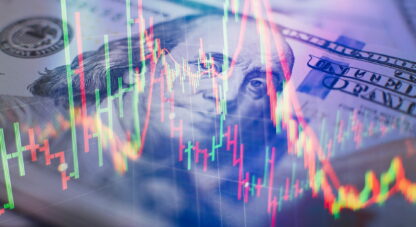About this week’s show:
- 4th U.S. default is threatened
- Half the globe turns negative on U.S. Treasuries
- 800k non-essential workers? No wonder we’re broke
The McAlvany Weekly Commentary
with David McAlvany and Kevin Orrick
Kevin: Goldman-Sachs, Dave, Goldman-Sachs. They seem to tell us exactly what we should be doing, while they do the opposite. The last time they talked gold down, and of course, used Bernanke’s name in the past, as well, they are trying to tell us that gold is a ridiculous investment, it’s a sure bet to sell for the next year, but you know, the last time they did that, Dave, they bought 3.7 million shares of GLD, which is the large gold ETF.
David: Yes, it is interesting to see talk on the one hand, and action on the other. I think men, in the end, are judged by their actions. This is where I think the rubber meets the road for investors who are concerned; they need to realize that the role of patsy is generally played by the general public, and the role of patsies, we described a few weeks ago, whether you have been Rothschilded, or Goldmanned, as it were, turning that to a verb, this is something that can happen to you. And it has happened in the past, where you are treated like a market patsy and you provide product at a discount for someone who wants to build a constructive interest.
Building a large position in gold is not easy. Building a large position in silver is not easy, because you are talking about very small markets. If you want to own a large position in gold or silver, the only way you can do that is by scaring it out of the woodworks, and if you can do that, granted, it is not everyone in the world who has the clout, or the voice, to do that, but Goldman certainly does.
Kevin: I think, Dave, back on last year when they were announcing first quarter earnings for the various firms, Merrill Lynch, Goldman-Sachs, J.P. Morgan, and the rest, Goldman-Sachs actually had not lost money on a single day for an entire quarter. Now, that’s mathematically impossible if they are playing the game fair, but at the same time, when the client ratings came out, if you’re a Goldman client, one of the little guys, it was one of the worst rated firms. (laughter) Now, let’s face it, if anybody here is listening and Goldman-Sachs is your broker, you need to understand, you’re the patsy.
David: (laughter) But you’re a privileged patsy, because you had enough money to, and this is where money and sense are not necessarily compatible. There are plenty of people who feel that it is a privilege to be taken, particularly if they are dealing with the likes of Goldman.
Kevin: And Goldman says it’s a privilege to take them.
David: That’s right.
Kevin: These guys are actually talking about that being fair game. But Dave, it’s not just in the financial markets that we see this. Look at the political grandstanding that is going on right now. These guys are swinging some pretty big clubs that could turn into a problem. Let’s face it. The Japanese, the Chinese, they’re going to get paid on their treasuries. We’re not defaulting on our debt. But that’s the fear that is right now being rendered in this political grandstanding.
David: And that continues with the claims that this would be the first time that the U.S. has ever defaulted on its debt.
Kevin: That’s not true, is it, Dave?
David: No, The Financial Times was quick to point out that we defaulted in 1790. Now, it’s a British paper, went by their headquarters just a few weeks ago, it was on the south side of London. They were pointing it out, not because the British were defaulted on, it was Dutch bankers and the French government who had the debt, and we defaulted on it in 1790, then in 1933 we defaulted again, and more recently, we had a technical default in 1979. So we’ve never defaulted, other than the three times just mentioned.
Kevin: Right, right.
David: So the question of whether we will or, in fact we need to, I guess that’s worth pondering, because the concerns are felt by the mass media here, by individuals here, and certainly abroad, by our foreign creditors. The Chinese and Japanese have been very vocal in the last 2-3 days, reminding the U.S. government to protect their investments. That’s their actual language, “protect our investments,” because listen, we are talking about two countries that have north of a trillion dollars at stake in that particular area.
Kevin: And I think we need to re-examine, we did last week, the interest component on these treasury debts that we’re talking about.
David: Yes, I want to correct a number, because we estimated what was going to be finally published, for 2013, the interest component on our national debt totaled 415 billion dollars.
Kevin: You had guessed 420 or 430.
David: Treasury direct, I forget if it’s .org or .com, but Treasury Direct has those numbers published, if you look at the interest listed there, it breaks it out by month. We thought it would be 420-430, that was likely given the run rate, but September only totaled 19 billion in interest payments.
Kevin: Only 19 billion.
David: Well, off of an average of 35 per month, it was actually on the low side. But 415 is the number, that is compared to revenues of 2.7 trillion, so that puts the interest expense at just over 15% of all revenues.
Kevin: That sounds to me like something that we’re going to continue to make, whether these guys raise the debt ceiling or not.
David: And the other issue is, if interest rates continue to move higher, then that’s where they’ve underestimated this year, and they are likely to underestimate in years to come. That’s what we were pointing out last week. They blew past the official government estimates by roughly 60%. This is why Jack Lew, this is why Barack, they’re running out of money. 150 billion here, that’s what they underestimated the interest component by, 150 billion there. A billion here, a billion there, 150 here, 150 there, it starts to add up to real money.
Kevin: They’re running out of money, but let’s face it, again, going back to what we were talking about before, the Chinese and the Japanese, who hold a lot of our treasuries, should not worry about us missing a debt payment, should they?
David: This is the part that is politicized, and I think, dangerously unnecessary. We have enough income to make payments on the debt coming due, and the interest payments on the national debt. The question is, do we have enough income for all of the governmental promises?
Kevin: You’re talking about Social Security, you’re talking about food stamps, Medicare, Medicaid.
David: These are noncontractual, and have nothing to do with our credit rating and debt maintenance. Politicians for decades have overpromised constituency groups. Why? Well, in the process of buying votes, you say, “Here’s the bacon I’m going to bring back to you. You’ve elected me to bring back that pork barrel spending to you, and I want your support in this election.”
Kevin: And so now, since we’ve got almost 50 million people on food stamps, we’re saying, we’re going to give those first, and then the treasury debt second, that’s not really true.
David: No, so here’s where the distinction is: They want to equate voter-promised largesse with our ability to pay our creditors. Both are an obligation in one sense of the word, but only one of those bears any relevance to our credit rating and the threat of an actual default. Recall that agreeing on a budget has always been – easy? No. No, it’s always been contentious. Literally, you watch both sides of the aisle. It’s like hyenas fighting for meat scraps. The core issue, for not just now, but in past decades, has been the inability to work with what you’ve got.
Kevin: They’re spending more than they’re making. I can’t do that for a long time, Dave.
David: Promise more in programs and payouts than you actually have in revenue and actual resources, and thus we have the need for additional borrowing. Debt ceiling remains the issue. Debt ceiling remains the issue.
Kevin: Yes, Dave, it’s not an issue of if they’re going to raise the ceiling, it’s just when, and how much.
David: Right. So, until that day when we promise only what we have resources for, we’re going to have this contentious wrangling back in D.C. Our credit rating isn’t tarnished by larger volumes of debt. Political charades are enough for rating agencies to get their feathers ruffled. We saw that in 1996, we saw that a couple of summers ago, 2011. Those come to mind. Our creditors are certain that with a 76,000-page tax code, we can extract more blood out of the turnip. We can get all the money we need to pay them off.
That’s why no one is fleeing treasuries. They look at the average tax rates that we have here compared to the rest of the developed world, and they realize that the Treasury can increase rates considerably, and fix this. Granted, that is a political hurdle to get over, but we do have the power, if we will, in fact, use it. I’m not suggesting it, I’m just saying that our foreign creditors do look at this fairly objectively.
Kevin: Well, Dave, put yourself in this position. Let’s say that you’re a banker, and you’re looking at a business, and you’re thinking, “All right, they want to borrow more money.” Well, first of all, as a banker, I want them to borrow more money. All I’m looking at is your ability to pay back that debt. And we do have that ability. We’re spending more than we make, but we still have the ability to extract, if necessary, what’s needed.
David: And it does come back to the issue of prioritizing. We want to make good on all of our “obligations” but some of our obligations are noncontractual. Some of our obligations, we can default on, to abuse that word, and it’s not actually a credit default. It just means that Social Security recipients might not get what they’re expecting. Medicare recipients might not get what they’re hoping for. It means that all of the spending programs that are in place may have to be altered. And then again, that’s where politicians don’t want to face the music.
Kevin: In reality, it’s not our inability to pay back the interest on that debt. We’ve got interest rates rising right now for other reasons, and I’d like to talk about that.
David: It’s the value of assets held by foreigners that is being damaged, has been damaged, considerably, this year, with the rise in rates. But that’s been happening for at least the last four months now. That’s without being pressed up against any deadline. So we have to look at the perspective and say, “Wait a minute, the media is really focusing on this date, but we’ve had a trend here that’s pretty important.” And this move in rates is a primary topic today, and actually, if you want to know where this takes my brain, it takes us from a U.S. storyline, to one that includes South Korea, China, Japan, and very curiously, Hungary, Turkey, and about ten different Eastern European countries. And we’ll try to get into that a little bit more in the weeks to come.
Kevin: We interviewed Robert Higgs a couple of years ago. He wrote Crisis and Leviathan, and he said to watch out for this gigantic thing he called Leviathan, which is the government getting so large it will do anything to survive. What we are seeing right now is a lot of factors that would raise interest rates in another part of the world being used for political reasons because the leviathan is trying to scare people.
David: Right, so the rise in rates is one thing. We’ll talk about the other, which is equally important, this fact that government would love to live and fight and grow another day.
Kevin: Leviathan.
David: They will, they will. This is really interesting. Ken Rogoff, a Harvard economics professor now, warned earlier this year, “The government is going to tax yourselves out of existence.” He went on to advise buying the old masters and hiding them.
Kevin: The paintings.
David: Yes, exactly. At this juncture, you, as an investor, need to be aware that the leviathan is moving into survival mode. What isn’t hidden will be taxed, or simply taken. Further capital gains taxes, dividend and income taxes, fee assessments, one-time wealth taxes. If it has been done in the history of mankind, it cannot be ruled out at this point.
Kevin: A confiscation bail-in. We even saw bail-in over in Europe.
David: Well, right. When you look at the confiscation of assets, that can be accomplished in many ways. We’ve already got a couple of them in play today. We’ve talked about interest rate repression, financial repression, where you keep interest rates at a very low level for a long period of time. We’re now in our 4th year of the zero interest rate policy, better known as ZIRP, and this is interesting, because they are redirecting income away from households to the national or the federal ledger.
Inflation – that’s another one. Inflation via expanded money supplies. We’ve got M2 and MZM, they’re rising at about a 7% annualized rate. You’ve got the potential for new taxes. This is what I’m saying. You could make a laundry list of ways in which confiscation of assets occurs, and we’ve got half of them already in play. The other half are coming.
Why? It goes back to that issue of Leviathan. They will survive, and you are the means by which they will survive – you, as an individual investor. Again, when I say it is equally important, I think this issue that Ken raises, you need to consider it. He’s not a scare-monger, he’s an economics professor, actually a chess master before he was an economics professor, and kind of happened into economics. But frankly, in the interviews that I have seen with him, he’s a pretty boring guy, not bombastic, or exaggerating certain points. This is the issue: “Government is going to tax yourselves out of existence.” That’s what he said to a group of investors this summer.
Why do you buy a Renoir? Why do you buy a Monet, a Manet? We talked about modern art. Note that he had the good sense to not recommend a Jasper Johns or another modern artist. You buy the old masters and hide them. The key is not buying the old masters, the key is the second part of that equation: Hide them.
Kevin: David, I think of the retired people who are listening right now, for the last four years plus, who have had to scrape just to make it because they’re not earning any interest. So what they did instead was, they moved to other assets. And even that, we’re seeing taxation and confiscation. But most of these retired people listening cannot afford a Manet. They cannot afford a Monet, and frankly, they don’t want a Van Gogh, they just want to have something that will retain assets for the next generation.
David: And one of the key elements of the old masters that I think is a disadvantage is that you can’t bury them.
Kevin: I know what you can bury.
David: Exactly.
Kevin: We know what holds value.
David: It underscores a very important issue – the nature of physical gold ownership. Think about this. It’s inherently anti big government. It’s one of the reasons why it’s not particularly popular with government, but again, it’s inherent to its nature. Number one, it creates independence from the system. Big government is only too happy to see the number of dependents rise, and this is something that does give you an out in terms of the system. Number two, it gives the individual control over their personal financial data.
Kevin: That’s privacy from Big Brother, Dave.
David: Look, we have the rise of “Big Data.” It’s given government access to everything we do. There is a thin line between access and control. Big Brother is not an Orwellian boogey-man.
Kevin: No, it’s here.
David: You have Big Brother as the NSA. You have Big Brother as Homeland Security. You have Big Brother as the leviathan currently on temporary furlough.
Kevin: Eight hundred thousand people.
David: (laughter).
Kevin: If these people are nonessential, why do we continue to hold on?
David: Isn’t that a great question? Is it any wonder why we’re broke? Private sector analysis would say if they’re nonessential, why are they working for you? They aren’t. That’s what defines a pink slip, they’re no longer essential.
Kevin: Do you have any nonessential people working here at McAlvany Financial right now?
David: No, no. (laughter)
Kevin: (laughter) Okay, all right, other than myself.
David: Well, the other thing, again, the nature of gold. When big government moves to protect itself by any means necessary, your big savings becomes little savings, either by outright theft or indirect thievery. That goes back to inflation, which robs the saver via negative compounding.
You want the quiet, nonexistent assets, and maybe even the portable asset. I think, Rogoff, again, he may like Monets or Renoirs, but as I mentioned earlier, you can’t bury them.
Kevin: Right. So David, you’re saying as long as we have a Federal Reserve, we have the ability to print money, as long as we have a Treasury and the ability to tax. What you are saying is, you have to have something that can protect that asset from those aspects.
David: Well, last but not least, we need gold because the Fed exists. This is really basic, we need gold because the Fed exists. And I suppose if the Fed went away, you could rethink an allocation to the physical metals.
Kevin: Well, we’re at the 100-year anniversary right now.
David: Exactly. The Federal Reserve, according to government inflation calculations, in that time frame, 100 years, has caused a 96% loss of purchasing power.
Kevin: And that’s using government calculations.
David: This is their first mandate, price stability. How have they done? On a self-graded basis, they get an A+. On an objective basis, we, the consumers, would say, 96% failure rate, gosh, that doesn’t even register as an F-.
Kevin: What that means is a dollar is worth 4 cents today.
David: The other thing that we are celebrating the 100th anniversary of is the income tax. You can recall that our tax code then, at its inception in 1913, we had 400 pages which governed our tax system at inception. We’ve basically added 700 pages every year, to bring us to our current 76,000 pages.
Kevin: Seventy-six thousand pages of tax code. That’s if they’ve even read it, along with Pelosi reading the health care bill.
David: Just like I’ve read Encyclopedia Britannica from cover-to-cover four times, because that’s what you are talking about. Four times the length of Encyclopedia Britannica. Has anyone alive read the tax code? Honestly, I would bet you 100,000 dollars that there is not a single person on the planet that has read every word of our tax code. I don’t know that it’s possible.
Kevin: Okay, we were talking about the Fed, then we talked about taxes. I want to go back to the Fed for a second, because quantitative easing should be picking up any of the slack right now in the treasuries that aren’t being sold. We saw that the Fed was buying over 100% of current-issue treasuries, so why are interest rates still rising? We don’t have to entice the rest of the world if we’re buying them from ourselves, do we?
David: Well, that’s the issue. Our foreign creditors are seeing a rise in rates, they are seeing the Fed, really, in essence, losing control of the bond market, but what is interesting is that their concerns are almost self-generated, and let’s look at that, because rates have been rising as the Fed has kept QE in motion.
Kevin: Right, quantitative easing is still going hard.
David: So, we go back to a topic that we discussed last year, what I would call dollar recycling, and then this is Paul Craig Roberts in an interview we did with him. He did, I think, an admirable job in shrinking this down. When did we do that? Six months ago? Twelve months ago? But just for example, you start with an American consumer, and they are buying things at Walmart, and the product comes from China.
Kevin: Right.
David: And the company that manufactured it in China gets paid…
Kevin: In dollars.
David: You have an in-flow of dollars into China, and once it’s converted to yuan, the domestic currency, it puts pressure on the value of that currency, the yuan, higher. Now, the Chinese government wants the currency at a low level. Why? So that the country continues to have a trade advantage, so that their products continue to move, and they continue to have a strong employment picture, because listen, you have unemployment in a place that has billions of people, guess what you have? Social unrest, chaos, a change in leadership, and nobody wants that. So, what do they do? They intervene, they print yuan, they buy dollar assets.
Kevin: Like treasury bills.
David: And the GSEs, government sponsored enterprises, Fannie Mae, Freddie Mac, those were the popular things earlier in the decade, and by buying the dollar assets, they offset the increase in yuan values coming from the inflows of dollars. So, essentially, what they are doing is neutralizing the currency appreciation, and allowing the Chinese manufacturer to maintain a trade advantage. Great benefit, here, for the tradable goods sector, and there is a direct cost to households, because this is inherently inflationary.
Kevin: Well, I have to think in simple terms, Dave. Okay, Paul Craig Roberts, when he was talking about how our government financed itself for so long, what we did was we ran about a 400-billion-dollar trade deficit – we ran a deficit, they ran a surplus with us. They turned around and bought our treasury bills, and that allowed us to go into debt and have 400-450 billion in government debt each year. That fueled it. We had a trade deficit, they had a surplus, they bought our treasuries. The problem is, Dave, now it’s 1.5, 1.6, 1.7 trillion that needs to be sold, so the Federal Reserve is having to print that money. But the other problem is, Dave, that was based on U.S. consumption, people going down to Walmart, buying lots of Chinese goods. That’s not happening en masse right now.
David: Yep, so when the U.S. consumer cuts back on spending, and the Walmart numbers, if you’re looking at these things, do indicate this, the Chinese don’t see the yuan appreciation due to dollar inflows to the same degree they did before, and the Chinese government doesn’t need to be as active in printing yuan and buying U.S. dollar assets to neutralize the U.S. dollar inflows. In essence, the emerging market demand for treasuries goes down, it wanes, when the developed world consumer quits spending. So the you’s and me’s, and anyone across this country who quits shopping, or tightens their belt a little bit, doesn’t buy everything that they used to at Walmart, it affects what the Chinese government has to do in terms of dollar recycling, there are less dollars to recycle, and guess what that means? As Paul Craig, Roberts pointed out, we can’t finance our debt needs, our refinancing needs.
Kevin: And this is a predictable outcome to a consumption-based society. If over 70% of our GDP is derived from people going down to Walmart and buying things, and then you have mom and pop right now looking at the budget and saying, “You know what, we can’t go to Walmart this week, we’re not going to buy those extra things.” They are de-leveraging. Debts are starting to get paid back. That’s a good thing, except the system that we have built up says, “No, that’s a bad thing. You have to keep going into debt, you have to keep spending to make this thing work.”
David: Yes, so we can’t just return to 2007. We can’t just return to the 1990s and expect households to be very interested in leveraging up and adding debt to their total balance sheet. Why? Well, mom and pop aren’t comfortable racking up lots of debt, and there’s a reason for this. They are more cautious in their spending. This isn’t just an economic issue, concerns about the 2008-2009 slowdown, and are we going to recover, are we going to get back to where we were?
But they are paying down debts for a very specific reason. The growth rates for household debt were just spectacular for about a 15-20 year period, but there was sort of a pig in the python, if you want to call it that. You had the baby boomer generation, and this young and up and coming generation was only too happy, and statistically, it’s pretty common for 35-48-year-olds to be adding to the debt equation, and then, at a certain point, about 54 years old and thereafter, you start diminishing the debt that you are willing to take on. As you move toward retirement you make a deliberate effort to pay off as much as you can so that you can retire and not be feeding the meter, in terms of interest payments.
Kevin: Well, if we were to rerun back to 2003, 2004, 2005, most of that consumption was being fueled by mortgages. It was the explosion that we had in real estate because of the mortgage explosion.
David: Yes, and that’s U.S. household debt, particularly influenced by home mortgages, and it’s at the lowest levels we’ve seen in 60 years. We’re talking about the growth rate of debt, that’s right now, compared to where we were just a few years ago. If our appetite for consumption, fueled by credit, whether it’s credit cards, or home equity loans, or what have you, is not growing, then what we have is a mismatch. We have a mismatch between government financing needs and the natural audience of creditors. That is, foreign creditors that aren’t buying as many treasuries, in large part due to U.S. consumer deleveraging. You could think of this as sort of a demographic deleveraging, in the sense that as people age they are more inclined to pay off their debt, and they don’t take on any more. That’s that pig in the python. That’s the baby boomer generation. That’s why I say it’s demographic in nature. They want to retire. Debt service sucks up too much income. So before moving to a fixed income, debt gets retired, and current income goes to that end rather than consumption.
Kevin: Well, and what about student loans? Dave, I mean, that’s the new norm.
David: The next few generations carry an ever-growing burden of student loans. We had previous generations that didn’t have all this burden as they launched from the nest. As a young adult they considered a first-time home purchase, and it looks more and more like we are stuck in a set of demographic ruts, because it is not just the baby boomers, it’s also the up and coming generation. One generation is deleveraging, getting rid of debt, the other is as leveraged as they can be already, and they are unwilling to leverage up, to go into more debt. This puts the onus on government to continue to spend in order to keep our GDP at a healthy place, and this is this Keynesian notion of propping up aggregate demand. You don’t want to see total demand in the economy shrink, so if the consumer backs away, government temporarily steps in. Temporarily – let’s redefine temporarily. Is this one year? Is this two months? Is this ten years? This is an entirely new system, and it’s not healthy.
Kevin: And the nightmare to the system is when rates rise, because there is not that much of an appetite for treasuries, and people really don’t have enough money to consume or spend, so you have rising rates, but you don’t have rising growth.
David: Right. If you don’t have the folks who have the appetite for treasuries, if they do cut back, they’re not filling the function they did before, they don’t need to. This goes back to that exchange rate management. They don’t want their currency to appreciate, so they’ve got this money newly created, yuan, and they go out and they buy U.S. dollar assets with it. So what’s really awkward here for both the Treasury and the Fed is that they’re not really in control of their own destiny. There is a need to fund the government. They have a shrinking audience of creditors, and within this financial picture, we’ve got an improvement on the one hand, we have the wealthy via asset appreciation, and then you have the larger economy which remains stagnant at best, and this is where that larger consumer base is coming from, and that’s the component that drives foreign demand for treasuries.
Kevin: One of the other things that has been fueling us, Dave, since we had the real estate collapse, is the rise of emerging markets. They filled the gap for a while, but at this point the emerging markets, these smaller countries that were fueling the treasury buying, those are also shrinking at this point.
David: Well, they’ve become a much more significant part of the total picture. The emerging markets now represent close to 50% of global GDP, so whereas they were less of an issue in the 1980s and 1990s, they are a much bigger player today, in aggregate, so things that are changing there, they do have a ripple effect. It’s not as if the small butterfly causes typhoons on the other side of the world. We’re not talking about small butterflies.
Kevin: They needed our consumption to continue to grow, we stopped consuming, they stopped continuing to grow – it is a symbiotic, sort of a dangerous symbiotic relationship.
David: Well, so there is a second issue for the emerging markets to deal with. They have decent balance sheets. They’ve got decent balance sheets because of the glory days of Western over-consumption, that’s very clear. But income is in decline. So, again, you can always look at a company and see how their balance sheet is, great. You also need to look at sales and the income statement and see what’s happening in terms of money coming in and money going out, because it’s not just a question of a snapshot in time balance sheet, because clearly, emerging markets are in a healthier place than we are in terms of debt levels and everything else. Well, I say some emerging markets, because there are actually a few that are dangerous, and that’s what we are going to get into in the next couple of weeks. But income is diminished, and to a degree where they, in fact, need to rebalance. They need to restructure. You have surplus countries which are reverting to the mean, and that can cause a tremendous amount of flight capital from foreign investors.
Kevin: Dave, that takes it from the emerging market side to our side. That cuts into our gains.
David: Because to the degree that you have something happening, a restructuring taking place, and capital flight from the emerging markets, there is a knock-on effect to our domestic financial markets. Look at Mexico in the 1980s, look at Asia in the 1990s. We saw the Fed step in and intervene significantly, as you had these hiccups around the world, and there was an echo of concern into our own markets.
Kevin: And we have the ability to lower rates. We’ve seen crisis in some of the emerging markets in the past that could be met just by our lowering of rates. The problem is, now, Dave, with ZIRP, we don’t really have much more to go.
David: Yes, well, you’ve got the flight of capital, which was crippling for local currencies, and it required a tremendous amount of currency intervention, massive selling of those assets. It shrinks the value of an emerging market currency, and it creates an inflationary concern for the man on the street. If you want to avoid social dislocation that comes from that sort of externally driven devaluation, where you have capital flight and foreign investment just being pulled from these emerging market countries, then governments end up reversing the role played earlier in order to keep their currency at a stabilized lower level. Now they have to prop up the currency, and here’s the crux. If they are going to prop up their currency, what resources do they use in order to stem the tide of currency devaluation in their domestic markets?
Kevin: Well, they own a lot of foreign assets, I would think that’s what they would dip into. They would sell their foreign assets.
David: We are the foreign assets. Surplus countries in the emerging markets – they are a probable igniter for the explosion of the U.S. debt markets. That is, you have rates that rise for several more years, and then we see prices in the bond market dropping, precipitated by what? Is it the wrangling in Washington? No, it actually is stuff that has been in play for about five years now. Arguably, the genesis is even before that. But you have an unhealthy balance of payments, and that, ultimately has ramifications as surplus countries rebalance, and as surplus countries rebalance, the implication is they don’t need, and they may, in fact, use the resources on their balance sheet to defend their currencies, and that means an outright liquidation of treasuries, really tipping the scales. Right now there is less of an appetite for treasuries. If you go one step further, from lack of appetite to puking treasuries into the market, guess what you have? You’ve got massive crisis here in the U.S.
Kevin: What we are really seeing, Dave, as complex as this is, because I’m telling you, having to go in and buy currencies, and move this and that, there is a lot of complexity in the system, and for the person who doesn’t follow this every day, they say, “Well, I don’t really know what that means.” But what it really means is, we had a model, a consumption-based model, that worked for about 40 years. We were able to buy from China, let’s say, and they were able to buy treasuries back from us. It was a scratch your back kind of thing. We scratched each other’s backs. But a system that’s based on people needing to spend more than they make, and continue to borrow more than they can pay back, that may look prosperous for a while, but this is what the death throes of that false paradigm brings, Dave, so what’s the take-away in this?
David: We’re in an interconnected and interdependent world. We must, even though this seems boring, we must care about European bank exposures, we must care about Asian economic rebalancing, we must care about the stocks and flows of treasuries, who owns what, how much of that stuff is on the move in the marketplace. Again, for the novice, the nonprofessional, or the merely curious, this may seem like a large burden. Why should I care? It’s the implications. It’s what happens to a system when, as you describe, Kevin, the system as we have known it is coming undone.
In the coming weeks we are going to explore the large levels of foreign currency indebtedness, and the likely devaluations amongst European countries. This includes European bank vulnerability, and a potential feedback loop into our financial markets, and we’re talking about 1-2 trillion dollars worth of exposure, which makes Lehman look like a walk in the park. And this could very well be what tips our stock market into chaos within months. So let me ask the question: Do you care if the stock market trades lower by 30-40% in the next few months?
Kevin: Well, you’d better.
David: Well, you’d better. And you must, therefore care about foreign currency indebtedness, you must therefore care about European countries and European bank vulnerability, their exposure to Eastern European liabilities. These things which seem like boring minutiae, are, in the fullness of time, the kinds of things that cause Lehman collapses, that cause systemic crises, and we have them more front and center and prominent today than, in fact, we had in 2007 and 2008.
Kevin: This brings me, then, to why I own gold, Dave. I’ve been with your family and its company for 26 years, and I’ve seen, the entire decade of the 1990s and the last half of the 1980s, when I first started, people weren’t buying gold because they got on the internet and tried to figure out whether the price was going up or down that day or that month. They didn’t buy it because it went up. They bought it because it wasn’t what we’re talking about right now. It was away from that. Do you think, and I know you do, because we’ve talked about this, do you think people are focusing too much on short-term price moves on gold right now, and missing the point that they can actually get something of value, and trade something that’s not valuable for it?
David: On Wall Street there is this common phrase, “picking up pennies in front of a steam-roller.” And it can be where you’re trying to do something you shouldn’t in terms of an asset. What comes to mind when you ask that question, Kevin, I’ll kind of rework that analogy, when people are trying to pick up a 100-dollar move, or a better price by this or that, or save a few bucks here or there in commission, do you know what you are forgetting?
You’re forgetting that the nature of physical gold ownership is inherently anti-big government, and you need to get your facts straight, and you need to get your priorities straight, because if you don’t have independence from the system, if you don’t have financial privacy in some form within your financial balance sheet, if you don’t have a way of protecting yourself from outright theft, just understand, you are the fodder that feeds the leviathan. You are the necessary ingredient for the growth of government and the survival of government in the years ahead. And good luck to you.
I’m not trying to be harsh, or cruel, or anything else, but yes, you should own gold, you should own gold for the right reasons, and you should insure against your own financial demise, and try to refashion what can and should be, and ultimately will be, an enduring financial legacy, but that does mean that you have to look at the system with a jaundiced eye.
So, when we look at the second point here, we did talk about gold, we also talked about the fragility in the financial system. Be careful. Be careful. Fragility is the new market constant, and all that we assumed underscored support in the financial markets, you can’t rely on it. There are changing relationships in international trade, and there are changing demand dynamics for products and financial instruments, with major ramifications for the U.S. stock and bond market. I don’t have to even mention the U.S. dollar, but that’s part and parcel to the equation.
These are issues that you have to keep front and center as you are making real-time decisions, right now.
















